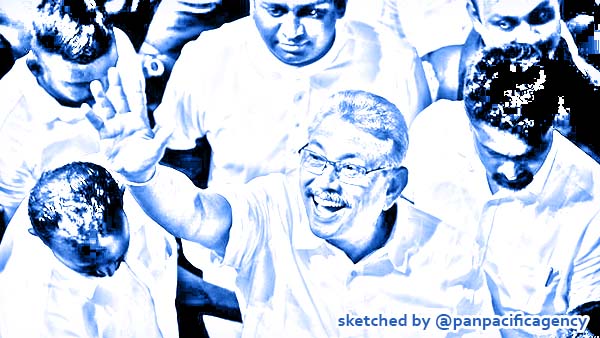[Analytics] Kashmir episode further dims chances of devolution of power to Sri Lankan Tamils

Gotabaya Rajapaksa was nominated as a presidential candidate during the Sri Lanka People's Front party convention in Colombo [Dinuka Liyanawatte/Reuters]. Sketched by the Pan Pacific Agency.
What is happening in India now in regard to federalism and devolution of power to Muslim-majority Jammu and Kashmir (J and K) region could further dims prospects of Sri Lankan Tamils’ getting power devolution beyond what they have been given de facto under the 13th Amendment of the Sri Lankan constitution. PK Balachandran specially for the BDNews24.com.
Through a Presidential Order on August 5, the Indian central government headed by strongman Narendra Modi, nullified Articles 370 and 35A of the Indian constitution which had given J and K State a large degree of autonomy. The Presidential Order also divided the State of J and K into two Union territories with very much less autonomy.
This was done with three objectives in mind: to fight Pakistan-inspired terrorism and separatism in J and K; to integrate J and K with India fully, and to facilitate economic development, hitherto hampered by restrictions placed by Art 370 and Art 35A on the application of Indian laws to J and K, and on the influx of labour and capital from outside the State.
RAJAPAKSA GIVES IT AWAY
In a significant interview to the Tamil daily Virakesari last Saturday, former Sri Lankan president and head of the opposition Sri Lanka Podujana Peramuna (SLPP) Mahinda Rajapaksa said that the devolution debate in the country will have to take into account the developments in J and K.
Rajapaksa did not elaborate, but given his expressed concern about national security in the context of perceived threats from Islamic terrorism and Tamil separatism, it was clear that he approved the steps taken by the Narendra Modi regime in India.
“There are two strands of opinion now. Some want a new constitution. Some want a federal arrangement. And some say that a political solution based on the 13th Amendment would suffice. But a solution should not be one that divides the country. Look at what has just happened in Kashmir. We need to take steps keeping all these in mind. We have to understand these factors while we pursue a political solution,” Rajapaksa said.
Adding weight to this contention, Rajapaksa said that the SLPP’s candidate for the December 2019 Sri Lankan presidential election would be a person who would “strengthen national security”.
By Saturday it was clear that the SLPP’s presidential candidate would be Mahinda’s brother and former defence secretary Gotabaya Rajapaksa, known for his no-nonsense approach to terrorism, separatism and devolution of power. He is also seen as a proponent of majoritarianism like Modi, a line favoured by Mahinda.
Gotabaya’s chances of winning have been enhanced by three factors: the Apr 21 multiple bombings carried out by Islamic zealots; the disregard shown to timely intelligence inputs from India about the attacks; and the progressive and manifest weakening of the Lankan security apparatus under the United National Party (UNP)- led government.
Given such a prospect, the UNP-led government’s bid to frame a new constitution to give greater power to the provinces in tune with the aspirations of the Tamil minority, is likely to be abandoned. In fact, it has been abandoned.
The bid to draft a new constitution had reached a final stage, but the government chickened out at the last moment because of perceived opposition both within the UNP and the opposition.
Speaking in parliament on July 26, Rajapaksa said: “After holding many discussions and releasing numerous reports over a period of more than two and a half years, on Jan 1, the prime minister tabled in Parliament a document which was described as the report of the panel of experts of the Steering Committee of the Constitutional Assembly.”
“Even in presenting that document to parliament, the prime minister insisted that its contents are not the views of the government but only of the panel of experts that compiled the report. Ultimately the report that was tabled in Parliament had no owner. How can a constitutional reform process succeed when nobody takes responsibility for the drafts that are tabled in parliament?”
“We are resolutely opposed to the draft constitution that was presented to parliament by the Prime Minister. It would have had the effect of dividing Sri Lanka into nine semi-independent states. It contained proposals to set up nine separate police forces, and provisions that would have made it impossible for the centre to take back any powers devolved to the provincial units.”
“Some say that I too spoke of ’13 Plus’ – a system of government going beyond the provisions of the 13th Amendment. I once told the then Indian Foreign Secretary that I was thinking of establishing a second chamber of Parliament made up of representatives of the provincial councils so as to get provincial leaders to participate in national affairs. It was the Indian Foreign Secretary who described my idea as 13 Plus. So it should be understood that what I meant by 13 Plus was not dividing the country into nine semi-independent units as proposed in the draft constitution that was tabled by the prime minister.”
“The draft constitution that was presented to Parliament was prepared by (Tamil National Alliance) parliamentarian Sumanthiran and some NGO activists. After presenting it to Parliament, the Prime Minister repeatedly denied ownership of the document. Ultimately it appears that this government had taken the Tamil National Alliance too for a ride. “
“Parliamentarian Sumanthiran always drafts constitutional amendments that will lead to a separate state without the name. They have stated their views very clearly on paper.”
With Gotabaya likely to win the coming presidential election given the felt need among the majority Sinhalese for a strong and functioning government in contrast to the bumbling and directionless incumbent UNP-led regime, the chances of the minority Tamils getting power devolution beyond what is available de facto are slim indeed.